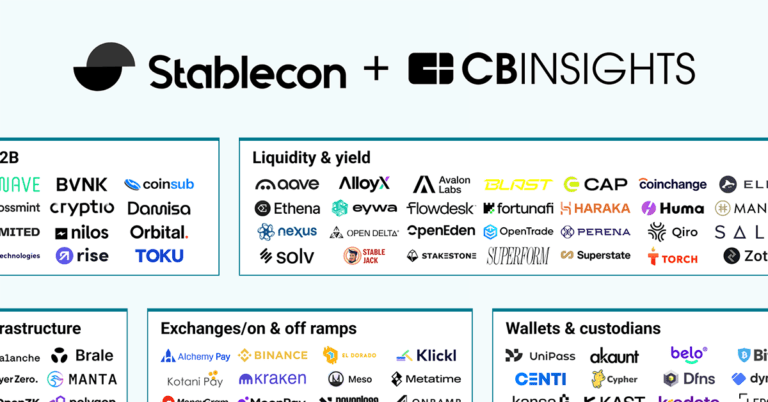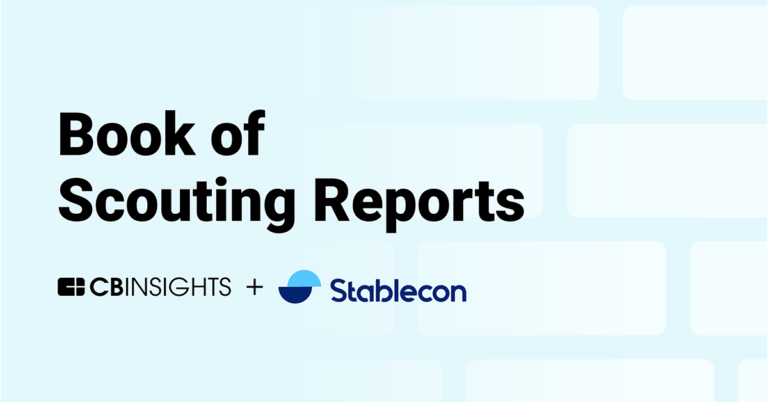
Conduit
Founded Year
2021Stage
Series A | AliveTotal Raised
$59MLast Raised
$36M | 1 mo agoMosaic Score The Mosaic Score is an algorithm that measures the overall financial health and market potential of private companies.
+358 points in the past 30 days
About Conduit
Conduit specializes in facilitating international business payments within the financial technology sector. The company offers a platform for cross-border transactions, enabling businesses to manage global cash flows and accounts payable without the need for a US bank account or credit card. Conduit primarily serves businesses engaged in international trade and financial transactions. It was founded in 2021 and is based in Kalispell, Montana.
Loading...
Loading...
Research containing Conduit
Get data-driven expert analysis from the CB Insights Intelligence Unit.
CB Insights Intelligence Analysts have mentioned Conduit in 2 CB Insights research briefs, most recently on May 29, 2025.

May 29, 2025
The stablecoin market map
May 23, 2025 report
Book of Scouting Reports: Stablecon 2025Expert Collections containing Conduit
Expert Collections are analyst-curated lists that highlight the companies you need to know in the most important technology spaces.
Conduit is included in 4 Expert Collections, including Blockchain.
Blockchain
12,861 items
Companies in this collection build, apply, and analyze blockchain and cryptocurrency technologies for business or consumer use cases. Categories include blockchain infrastructure and development, crypto & DeFi, Web3, NFTs, gaming, supply chain, enterprise blockchain, and more.
Payments
3,198 items
Companies in this collection provide technology that enables consumers and businesses to pay, collect, automate, and settle transfers of currency, both online and at the physical point-of-sale.
Fintech
9,653 items
Companies and startups in this collection provide technology to streamline, improve, and transform financial services, products, and operations for individuals and businesses.
Stablecoin
433 items
Latest Conduit News
Jun 24, 2025
Image: Fireblocks Share Especially for businesses in the global south, cross-border transactions are still defined by slow wires, hidden fees, and clunky banking infrastructure. Conduit , a four-year-old fintech based in the US, has been attempting to rebuild the plumbing of international money movement using blockchain and stablecoins. And after a quiet pivot away from decentralised finance (DeFi), the company says it’s found product-market fit in the real economy. Conduit recently raised a $36 million Series A round led by Dragonfly Capital, bringing its total funding to $53 million. It claims to be processing over $10 billion in annual transaction volume for 5,000+ merchants globally, with an embedded presence in over 100 fintech platforms. But the backstory of how it got here, and how it plans to scale, reveals more than just another crypto-adjacent payments play. From DeFi dreams to TradFi trenches Founded in 2021, Conduit initially focused on providing DeFi tools to institutions by offering APIs for fintechs and neobanks to integrate yield-generating crypto products. The collapse of firms like Terra and FTX in 2022 didn’t directly cause Conduit’s pivot, but it pushed startups with similar models to rethink their approach. “We moved from focusing on building integrated decentralised finance tools, to enabling cross-border payments for businesses using stablecoins and harnessing the power of blockchain,” Kirill Gertman, Conduit CEO, told TechCabal in an email. The company’s shift was not just about distancing itself from a broken DeFi ecosystem, but finding a clearer, more pressing problem to solve. “When we shifted to a cross-border payments product, it was about realising we needed a more differentiated and defensible offering,” Gertman said, adding that “cross-border payments in emerging markets was a much more clear and urgent problem to solve.” How does Conduit earn revenue? Conduit’s model rests on stablecoins, which are crypto tokens pegged to fiat currencies like the U.S. dollar. These stablecoins are what the company uses to settle payments across borders. This model gives Conduit an edge in terms of speed, but the real trick lies in how it handles conversions and compliance across border lines. Unlike traditional providers that may charge separately for currency exchange and payment processing, Conduit says it keeps costs consolidated. “Our platform is built to move money across borders,” Gertman said. “FX is one of the pieces that makes that possible, but our customers aren’t being double-charged, they are charged for moving money from point A to point B.” In other words, Conduit bakes the FX and transaction costs into a single rate, rather than layering fees. This approach, it claims, helps reduce friction for customers and maintain price clarity. The firm earns revenue in two ways: it charges a fee each time a customer sends money, and it also earns from the difference between the rate it gets when converting currencies and the rate it offers to customers. This difference is known as the FX spread. So if Conduit converts stablecoins into local currency, say USDC to Kenyan shillings, it might get one rate from its bank partners but charge customers a slightly higher rate. That small margin becomes part of its revenue. But Conduit says its use of blockchain helps keep overall costs lower. It claims to offer better pricing and faster delivery than traditional systems by settling payments faster and cutting out some of the middlemen, like correspondent banks. Get the best African tech newsletters in your inbox ?> Growth through geography Conduit’s core clients are businesses that need to send money internationally, especially those paying suppliers or contractors in hard-to-reach markets. That includes payroll platforms, exporters, importers, and marketplaces. “We see a lot of growth from people wanting to make payments from the US internationally,” Gertman added. “We are seeing huge traction in Brazil and in Asia right now. A big focus of our Series A investment round is geographic expansion of our payments network, and we plan to open our first office in Asia later this year.” The company operates in nine countries and supports 14 different currencies, partnering with more than 20 local banks. One such partnership in Brazil offers a glimpse into how Conduit builds infrastructure-level advantage. “Braza [Group] owns the largest Brazilian foreign exchange bank and launched their own stablecoin tied to the Brazilian Real in February 2025,” Gertman said. “They have integrated that functionality directly into the Conduit platform, so when a Conduit customer uses our platform to make payments from Brazil to the U.S. or Europe in Brazilian Real, Braza Group will mint a stablecoin on the backend, which Conduit can swap for a U.S. or EUR dollar-backed digital currency.” The rails are the same, but with new thinking That tight integration between stablecoins and traditional rails is core to Conduit’s vision. “Our vision is to build the most seamless and scalable global payments network in the world that can replace correspondent banking,” said Gertman. “That is going to affect how we build, how we think and how we go to market.” In many emerging markets, businesses can’t easily access global banking, setting up foreign accounts or using SWIFT can be slow, expensive, or blocked. Platforms like Stripe and AZA Finance offer workarounds, but Gertman says Conduit goes further by embedding directly into local bank infrastructure and serving high-frequency business users, not just developers or exporters. The focus is on deep integration with banks and hands-on use cases beyond APIs, like payroll and supplier payments. “We’re actually working to enable customers to move money globally,” he said. “We’re all looking at different types of customers.” How does Conduit approach regulations? As a stablecoin-based platform operating across multiple countries, Conduit faces steep compliance expectations. The company says it has built this into its product from day one. “Innovation and compliance are core pieces of the Conduit platform, and we have integrated AML, sanctions screening, and transaction monitoring,” Gertman said. “Our platform is designed to fully comply with the unique regulatory requirements of each market we operate in.” Gertman added that the company uses “a rigorous set of tools that monitor transactions across both fiat and on-chain transactions,” and that it has implemented “more precise, responsive and auditable controls with full transparency.” Profitability goals? One of Conduit’s stated goals last year was to reach profitability. It hasn’t, but that’s intentional. “We made the decision last year not to be profitable, but operate very close to breakeven, to focus on growth,” Gertman said. “We have a low burn rate and healthy revenue, which gives us optionality moving forward.” Conduit did not offer the specifics of this burn rate. The Series A funds will allow the company to double down on new markets, including Asia and Africa. “We are thoughtful about expanding to where there is most demand for our product, which means there is little tradeoff between expansion and profitability,” he added. The hard part is the boring part Cross-border payments have never been easy, and most people who use these services are sometimes not interested in the work that happens at the backend. Yet Conduit’s view is that the most transformative financial infrastructure will be invisible. The fintech startup wants to make sending money from Nairobi to New York a less cumbersome experience, and believes the best way to do that is by embedding itself at the core of how money moves. For the most part, Conduit’s playbook is similar to that of fintechs like it, but the difference might emerge in how it can keep pace with increasing competition and growing regulatory scrutiny as it expands into new markets. Mark your calendars! Moonshot by TechCabal is back in Lagos on October 15–16! Join Africa’s top founders, creatives & tech leaders for 2 days of keynotes, mixers & future-forward ideas. Early bird tickets now 20% off—don’t snooze! moonshot.techcabal.com Share this article
Conduit Frequently Asked Questions (FAQ)
When was Conduit founded?
Conduit was founded in 2021.
Where is Conduit's headquarters?
Conduit's headquarters is located at 1001 Street Main Street, Kalispell.
What is Conduit's latest funding round?
Conduit's latest funding round is Series A.
How much did Conduit raise?
Conduit raised a total of $59M.
Who are the investors of Conduit?
Investors of Conduit include Portage Ventures, Commerce Ventures, Altos Ventures, Helios Investment Partners, Circle Ventures and 18 more.
Who are Conduit's competitors?
Competitors of Conduit include Melio and 5 more.
Loading...
Compare Conduit to Competitors

BitPay provides cryptocurrency payment processing and digital wallet services within the financial technology (fintech) sector. It offers a platform for individuals and businesses to buy, store, swap, sell, and spend cryptocurrencies and tools for merchants to accept cryptocurrency payments. Its services are available to various sectors, including e-commerce and real estate technology. It was founded in 2011 and is based in Atlanta, Georgia.

PaySend provides a global payment ecosystem that operates in the financial services industry. The company's main service is to enable consumers and businesses to pay and send money online, supporting cross-network operability globally across major card networks and providing over 40 payment methods for online SMEs. PaySend primarily serves the e-commerce industry. It was founded in 2015 and is based in London, United Kingdom.

Zepz is a company in the financial technology sector that facilitates international payments. It provides digital solutions for sending money across borders, including options for bank deposits, cash collections, and mobile money services. Zepz serves the ecommerce industry by offering online money transfers. The company was formerly known as WorldRemit. It was founded in 2021 and is based in London, United Kingdom.

Veem offers a payment platform for businesses to send and receive money globally. It provides flexible digital payments, competitive exchange rates, payment tracking, and workflow automation. It serves various industries such as e-commerce, freelancers, manufacturing, and others. The company was formerly known as Align Commerce. It was founded in 2014 and is based in San Francisco, California.
Capi facilitates international payments for businesses in Africa that operate within the financial technology sector. The company provides foreign currency exchange services and enables payments to international suppliers in EUR, USD, or GBP. Capi serves importers in Africa who need methods to settle overseas invoices. It was founded in 2023 and is based in Wilmington, Delaware.

Rapyd focused on global payment processing and financial services infrastructure. The company provides products including online payment acceptance, in-store payment solutions, and financial services for businesses, such as global accounts and multi-currency management. Rapyd's platform supports e-commerce transactions, lending, remittances, and offers compliance and risk management solutions. It was founded in 2016 and is based in Essex, United Kingdom.
Loading...
